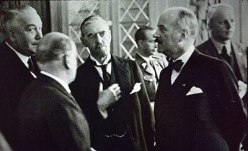
The Architect of Appeasement
Facing the Fascist Threat
After the ‘War to End Wars’ the Nations embarked upon measures to prevent such carnage happening again.
Or so some thought…
Although a system of collective security had been set up, the ‘League of Nations’ was toothless, and by the 1930s had spectacularly failed to intervene in key military and geo-political conflicts from Manchuria to Abyssinia.
Some people saw ‘Appeasement’ as a necessary evil, believing compromise with fascism was better than conflict – that ‘jaw jaw is better than war war’ – and it’s proponents, most notably British Prime Minister Neville Chamberlain were hailed as ‘peacemakers’.
‘Appeasement’ meant sitting down and negotiating with the dictators, and coming to an accommodation with them to avoid war at all costs.
Others argued that Britain was not ready for a major war, or that France had settled into a defence mentality behind it’s Maginot Line.
The USA had adopted a policy of isolation, while the newly-communist Russia had been transformed into the Soviet Union, widely treated as a pariah state by the European elite – and, some argued, a bigger threat to their wealth and property than fascism, which at least sort to smash pesky working class organisations shouting about socialism.
The debate on the nature of Appeasement has raged ever since, returning whenever a major international conflict has seemed to loom on the horizon.
Eden employed such anti-appeasement rhetoric when trying to justifiy his disastrous Suez campaign of 1956, while Thatcher summoned the spirit of Churchill in the Falklands war of 1982. When the American Secretary of State, Alexander Haig, urged her to reach a compromise with the Argentines, she rapped sharply on the table and pointedly told him that “this was the table at which Neville Chamberlain sat in 1938 and spoke of the Czechs as a faraway people about whom we know so little”….and today the subject is high on the agenda of students and politicians the world over.
Eden resigns
The very same Anthony Eden, then senior National Coalition (Conservative) Foreign Minister, resigned over the drift towards a policy of Appeasement towards the dictators.
“I do not believe that we can make progress in European appeasement if we allow the impression to gain currency abroad that we yield to constant pressure. I am certain in my own mind that progress depends above all on the temper of the Nation, and that temper must find expression in a firm spirit. This spirit I am confident is there. Not to give voice to it is, I believe, fair neither to this country nor to the world.”
Feb 21, 1938
“Using” the Fascists
Appeasement was largely the failure to confront the rise of fascism. But one key question remained – did some people really want fascism?
Certainly newspapers like the Daily Mail are on record as welcoming it in some 1930s editorials. Lord Rothermere wrote a front-page article entitled ‘Hurrah for the Blackshirts’ in January 1934 and it was clear that like the ‘Good Lord’, many members of the Establishment saw Oswald Mosley’s British Union of Fascists a bulwark against Communism, and an opportunity for moving from what they saw to be a moderate and undynamic Government to one that was more nationalistic and powerful.
Meanwhile, a view recently unearthed in the Soviet archives shows that many Russians believed the Western powers aimed to point the fascists in the direction of the Soviet Union. Hitler had openly wrote of his desire for colonies, and the Soviet Union was conveniently in totally opposite direction to ill-gotten European colonial possessions in other parts of the world.
Conservatives especially were constantly pre-occupied with the Axis threat to British colonies. Italy had threatened to undermine the British position around Suez with its possessions in Libya and Abyssinia, whilst Japan looked south towards an array of hardly defensible British, French and Dutch colonies in the East Indies and South Asia. Germany, meanwhile, had her African colonies removed after WW1 and their return would certainly have threatened the very existence of the British Empire and its ability to defend its trade routes.




